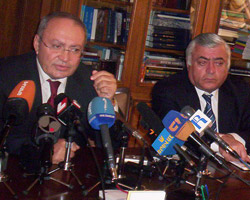The committee members include head of the Fight against Corruption department of the prosecutor’s office Mihran Minasyan, head of the control/supervising department Gagik Avetisyan, elder adviser to the general prosecutor Hovhannes Stepanyan, vice-director of the National Assembly House of Supervisors Gegham Gasparyan and vice-director of the Supervising department of the Prime Minister Ashot Setrakyan. The committee will check up to see if the police, prosecutors and border-watchers are really involved in human trafficking. During a press conference yesterday, General Prosecutor of Armenia Aghvan Hovsepyan said that the committee has conducted a study on the news printed in the press.
“This is the first time that we actually feel the need of a committee. We place high emphasis on the role that media plays in all this,” he said.
U.S. Ambassador John Evans was also present at the conference upon the general prosecutor’s request, although Evans made no comment on the development of human trafficking in Armenia. A couple of days ago, the general prosecutor received a letter written by the U.S. Ambassador in which he places high emphasis on the role that prosecutor’s play in the fight against human trafficking. A. Hovsepyan considers human trafficking as a crime and claims that although slavery has been abolished thousands of years ago, however, there are certain people who still treat others as slaves.
“We have to fight against that, so that no one treats the other like a slave. Human trafficking is just like slavery. It’s not only about arresting and sentencing traffickers, but rather it is about making them get the idea of trafficking out of their heads,” said the general prosecutor and thanked the mass media, especially investigative journalist Edik Baghdasaryan from “Hetq”. Hovsepyan said that if it weren’t for the articles published by “Hetq”, they wouldn’t be so aware of the situation at hand.
“I want the mass media to follow up on police and call on all journalists to be more active,” he said and advised the journalists to bombard the head of the fight against corruption department and committee member Mihran Minasyan with all the questions that they have.
Mr. Minasyan stated that the committee has mainly been based on the 2004 annual human trafficking and the 2005 mid-term reports prepared by the U.S. State Department, where it is stated that the U.S. accuses Armenia of police involvement in human trafficking. Elder adviser to the State Secretary of the U.S. Ambassador John Miller told journalists that he can’t provide any evidence on that because the information was given by the mass media. One of the main proofs is the booklet entitled “Nights in the Desert” prepared by head of the Investigative Journalists NGO Edik Baghdasaryan. “Nights in the Desert” gives a total image of human trafficking in the United Emirates, Dubai and other parts of the Middle East. Baghdasaryan also brought up another piece of evidence during his interview with a reporter from “Azatutyun” radio station at a press conference, according to which there are some recordings of prostitutes claiming that they have bribed some officials fighting against human trafficking. The general prosecutor’s office has asked Baghdasaryan to provide them with the recordings; however, Baghdasaryan has refused based on the fact that he is taking into consideration the prostitutes’ personal reasons. Mr. Minasyan says that they haven’t been able to provide accurate information which could have served as a means to start persecution. Based on the evidence from the cases, it has been proven that there are many prostitutes in the United Emirates under the name of an Armenian female pimp. They fear coming back to Armenia because they will have to face the persecutors. The committee members agree that they have to take action to prevent such crimes. According to them, they have to work on migration, rehabilitation of refugees, adoption, tourism, state border defense, customs, employment centers, passport registration, invitations, as well as other services. In addition, the police are not conducting operative searches on persecuting the criminals.
Mr. Minasyan says that Armenia will not get anywhere by working with Turkey because police in Armenia can not cooperate with Turkey. In 2005, there were 30 cases of human trafficking-15 in the regions and 15 in districts. Forty cases have been tried in the courts. In 2005, 182 women were sexually abused; that’s a pretty high number. Ninety nine people have been arrested. 206 prostitutes have gone through medical examinations and 55 of them have been diagnosed with venereal diseases (18 have gonorrhea while 8 have syphilis). Both A. Hovsepyan and M. Minasyan asked journalists to inform the prosecution if they reveal any cases. Question: how do journalists get information regarding human trafficking and courts don’t?

